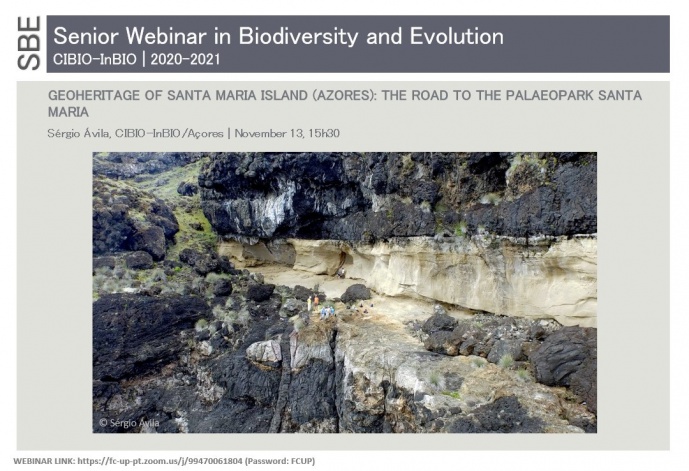Geoheritage of Santa Maria Island (Azores): the road to the PalaeoPark Santa Maria

SENIOR WEBINAR IN BIODIVERSITY AND EVOLUTION
By definition, truly oceanic islands have never been in contact with continental landmasses. Many of these islands are geographically isolated and developed peculiar biological communities that harbour endemic species. Examples of such remote islands/archipelagos are Kerguelen Island in the Indian Ocean, Easter Island, the Galapagos and the Hawaii archipelago in the Pacific Ocean, or Ascension Island, Tristan da Cunha and the Azores, in the Atlantic Ocean. On these sites, the impact of human colonisation and the invasion of these fragile habitats by his commensal animals (such as rats and cats), together with the vast deforestation and over-exploitation that was done in many of the islands, resulted in high extinction rates of insular fauna and flora and islands’ biodiversity losses. In the last years and with the support of Governments and privates, protective measures based on scientific inventories and management plans have been put in place in many archipelagos, in order to save what is left. Generally, such actions aim to get support from the local communities towards the biological, palaeontological and geological conservation of exceptional sites, involving inhabitants in the decision-making processes and in the management plans. Within the framework of these objectives, UNESCO created Geoparks, to protect the geological landscape, and Biosphere Reserves, to protect important ecosystems. We herein propose a new category, to be present to UNESCO – Palaeoparks – aiming to protect internationally relevant geosites with outstanding fossil content.
In 2018, legislation was produced by the Government of the Azores, leading to the creation of the first worldwide Palaeopark. This Palaeopark Santa Maria protects the entire island, focusing on twenty fossiliferous geosites and their palaeontological heritage whose evaluation resulted in two geosites with international relevance.
Sérgio Ávila is a Principal Investigator of CIBIO/InBIO and is based on the BioIslands group, at the Azores. He is an expert on marine biogeography and on the use of coupled fossils/recent marine organisms to test new biogeographic theories. His team has been studying the patterns and processes of dispersal, colonization and speciation of shallow-water marine invertebrates in oceanic islands. His team has experts on marine molluscs, echinoderms, crustacean barnacles, ostracods and coralline algae forming rhodoliths. His main interests are the geological evolution of the NE-Atlantic islands, and the palaeontology, palaeoecology and palaeobiogeography of Neogene to Recent ecosystems in reefless volcanic oceanic islands. Just published a theory that explains the marine global biogeographic processes and patterns on volcanic oceanic islands - the Sea Level Sensitive (SLS) dynamic model of marine island biogeography - where state-of-the-art checklists from the entire Atlantic Ocean and the Mediterranean Sea were fundamental. Outreach is a fundamental area of his research, and as a result of a sustained strategy, tourism assets were produced: a Route of the Fossils, a Museum entitled "The Fossils House”, and the first worldwide PalaeoPark.
[Host: Paulo Célio Alves, CONGEN]